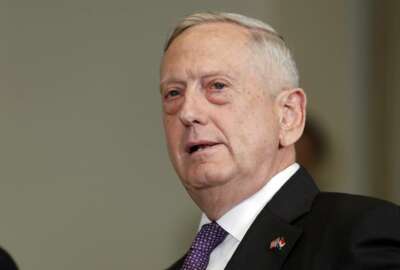
Congress orders DoD to study changes to its officer promotion system
A provision in the annual defense bill mandates a new Pentagon analysis of current personnel policies and whether they're harming officer retention.
Subscribe to Federal Drive’s daily audio interviews on iTunes or PodcastOne.
After several consecutive years in which the reform-minded armed services committees on Capitol Hill have focused their attention on the Pentagon’s acquisition policies and organizational structure, next year may finally be the year when its personnel policies get substantial attention.
The final version of the 2018 defense authorization bill, hammered out by House-Senate conferees and overwhelmingly approved by the House on Tuesday, includes a provision ordering the Defense Department to deliver a set of recommendations on reforming career management for military officers by the end of March. That report is a likely prelude to personnel management changes to be considered in the 2019 NDAA.
Specifically, the language calls for DoD to conduct a comprehensive review of the impacts of the Defense Officer Personnel Management Act, the 1980 law that defines most of today’s promotion policies for officers.
Lawmakers ordered DoD to conduct a statistical analysis, based on surveys of people leaving the military, of the effects the current policies are having on recruiting, retention, and career development. The Pentagon report is supposed to include an estimate of the number of officers who depart the armed services each year because of unhappiness with “career progression, promotion policies, and a perceived lack of opportunity for schooling and broadening assignments.”
On Tuesday, Sen. John McCain (R-Ariz.), the chairman of the Senate Armed Services Committee, called the current DOPMA-based rules “outdated” and “overly rigid,” partly because of their across-the-board enforcement of training requirements and an up-or-out approach to military officer promotion and retention.
“One of today’s most pressing personnel challenges is the worsening pilot shortage. We’ve heard over and over that flying time and career stability are crucial to solving this crisis. Yet, DOPMA-driven personnel policies require pilots to assume numerous staff assignments, relocate every two-to-three years, and complete military education courses, all in order to be promoted according to inflexible timelines,” McCain said. “All of this is done to turn every officer into the military’s next general or admiral. Well, not every officer wants or needs to be a general officer, and it’s about time we figured out how to provide for more variety in military careers.”
Numerous think tanks and blue ribbon commissions have also recommended that DoD and Congress reexamine the military’s approach to officer promotion. One such report by the Bipartisan Policy Center in March called on Congress to replace the “up-or-out” promotion system with a “perform-to-stay” model that experts said would reduce the military services’ tendency to kick out high-performing officers simply because they did not make the cut before a promotion board.
And the Defense Department has already made a handful of proposals to add more flexibility to DOPMA as part of former Defense Secretary Ash Carter’s Force of the Future initiative, but Congress has been hesitant to enact them, saying the department has not yet supplied adequate data — such as exit surveys — to prove that they’re needed.
One such proposal, submitted by the Pentagon to Capitol Hill this year, would have allowed the military services to reorder promotion lists so that officers “of particular merit” would be placed at the front of the line. The measure was agreed to by the Senate, but was stripped from this year’s NDAA during House-Senate negotiations.
But Sen. Thom Tillis (R-N.C.) also suggested on Tuesday that the armed services committee would be conducting more comprehensive work on DOPMA reform as it drafts its version of the 2019 NDAA.
With that in mind, he said the department should “get on a fast track to provide us with things that will be instructive to the recommendations we make next year. We’re going to make recommendations. I think the best ones are ones that we collaborate on, versus the ones we give to DoD, because that could be complicating.”
Anthony Kurta, the career civil servant who’s currently performing the duties of the undersecretary of defense for personnel and readiness — and who the president has nominated to be the office’s principal deputy — said the department had been studying potential DOPMA changes for several years, but stopped far short of saying the law needed a wholesale rewrite.
“It has served our military well for many years,” Kurta said. “It is the bedrock of the all-volunteer force, and generally speaking, for a large majority of the force, it works. It provides us a vital, relatively young and fit force. That said, I think it’s clear as the nature of warfare changes and we get into an area and a time where there are more technical skills that are required, whether it’s IT, cyber, any number that you can pick, that sometimes DOPMA is a little bit constraining.”
In technical fields in particular, Kurta said the military services need more legal discretion to onboard new officers at higher pay grades, rather than requiring them to begin their careers as second lieutenants or ensigns.
“We need lateral entry flexibility, much like we do in the medical system, to bring people in with specialized skills,” he said. “And then we need to look further at specialized career tracks that don’t require everybody to participate in the up-or-out system. I think those are two limitations, and if confirmed, I would be happy to work with the committee for further changes to DOPMA.”
Copyright © 2025 Federal News Network. All rights reserved. This website is not intended for users located within the European Economic Area.
Jared Serbu is deputy editor of Federal News Network and reports on the Defense Department’s contracting, legislative, workforce and IT issues.
Follow @jserbuWFED






